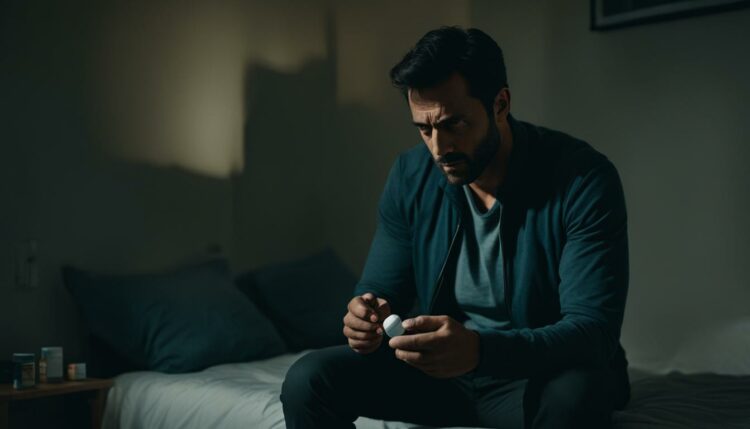Performance anxiety and erectile dysfunction (ED) are common sexual issues that many men face.
Research has shown a link between performance anxiety and ED, with negative thoughts and stress playing a role in both conditions.
Performance anxiety can be caused by concerns about body image, fear of sexual inadequacy, or stress from work or relationships.
On the other hand, ED can have various causes, including physical factors such as blood vessel disorders or psychological factors like depression or stress.
It’s important to seek help from a doctor to address these issues and find appropriate solutions. By understanding the symptoms, causes, and treatment options for performance anxiety and ED, individuals can regain confidence and enjoy a fulfilling intimate life.
Key Takeaways:
- Performance anxiety and ED are linked, with negative thoughts and stress as common factors.
- Performance anxiety can be caused by body image concerns, fear of sexual inadequacy, or stress.
- ED can have physical or psychological causes such as blood vessel disorders or depression.
- Seeking help from a doctor is important to address performance anxiety and ED.
- Treatment options for performance anxiety and ED can include medication, therapy, and lifestyle changes.
Understanding the Symptoms of Performance Anxiety and ED
Performance anxiety and erectile dysfunction (ED) can manifest in various symptoms that can greatly impact one’s sexual well-being. Recognizing these symptoms is crucial in seeking appropriate treatment and finding effective solutions.
Symptoms of Performance Anxiety:
- Premature ejaculation
- Delayed ejaculation
- Loss of sexual interest
Performance anxiety can cause an individual to experience difficulties in controlling their sexual response, leading to premature or delayed ejaculation. Additionally, it can result in a reduced desire to engage in sexual activities.
Symptoms of Erectile Dysfunction:
- Difficulty in achieving or maintaining an erection
- Loss of sexual desire
Erectile dysfunction is characterized by the inability to achieve or sustain an erection that is firm enough for sexual intercourse. This can cause frustration, anxiety, and a decrease in sexual desire.
These symptoms can have a significant impact on an individual’s self-confidence, relationship, and overall quality of life. It is important to consult with a healthcare professional to discuss these symptoms and explore suitable treatment options.
Addressing performance anxiety and ED requires a comprehensive approach that considers both the physical and psychological aspects of these conditions. The next section will delve into the causes behind performance anxiety and ED, providing further insights into understanding these issues.
Causes of Sexual Performance Anxiety and ED
Sexual performance anxiety can be triggered by various factors, including body image insecurities, pressure to satisfy your partner, past negative sexual experiences, and challenges within your relationship.
General stress and anxiety can also contribute to performance anxiety. On the other hand, erectile dysfunction (ED) can have both physical and psychological causes.
Physical factors may include hormonal imbalances, blood circulation issues, or certain medical conditions, while psychological factors may range from depression to relationship difficulties.
Factors Contributing to Sexual Performance Anxiety
When it comes to sexual performance anxiety, several factors can play a role:
- Body image insecurities: Feeling self-conscious or dissatisfied with your body can create anxiety and negatively impact sexual performance.
- Pressure to satisfy a partner: High expectations to perform well in bed, whether imposed by yourself or your partner, can lead to anxiety and performance-related stress.
- Past negative sexual experiences: Previous episodes of unsatisfactory sexual encounters or traumatic experiences can contribute to performance anxiety, as they create apprehension and fear of repeating the same outcomes.
- Relationship challenges: Conflicts, lack of emotional connection, or unresolved issues with your partner can increase anxiety and affect sexual performance.
Factors Contributing to Erectile Dysfunction
Erectile dysfunction can have diverse causes, encompassing both physical and psychological factors:
- Physical factors: Hormonal imbalances, such as low testosterone levels, or underlying medical conditions like diabetes or heart disease, can contribute to erectile dysfunction. Additionally, issues with blood circulation, specifically impaired blood flow to the penis, can hinder the ability to achieve and maintain an erection.
- Psychological factors: Psychological factors play a significant role in erectile dysfunction, with depression, anxiety, stress, or relationship difficulties all potentially contributing to the condition. Performance anxiety itself can also exacerbate ED symptoms.
Identifying the underlying causes of sexual performance anxiety and erectile dysfunction is crucial in order to seek appropriate treatment options. By addressing the specific factors contributing to these conditions, individuals can target the root causes and work towards finding effective solutions.

Treatment Considerations
The treatment approach for sexual performance anxiety and erectile dysfunction can vary depending on individual circumstances. It’s important to consult with a healthcare professional who can assess your specific situation and provide tailored recommendations. Treatment options may include:
- Medication: Certain medications, such as phosphodiesterase type-5 inhibitors (PDE5 inhibitors), can help improve erectile function and manage ED.
- Therapy: Psychotherapy, including cognitive-behavioral therapy (CBT) or sex therapy, can address performance anxiety and provide coping strategies. Couples counseling may also be beneficial in resolving relationship challenges.
- Lifestyle changes: Incorporating regular exercise, maintaining a healthy diet, and reducing stress levels can positively impact both sexual performance and overall well-being.
Remember, finding the right treatment options may involve a combination of approaches and may require time and patience. With professional guidance and a proactive mindset, individuals can regain control over their sexual health and overall satisfaction.
Coping with Performance Anxiety and Managing ED
When it comes to managing performance anxiety and coping with ED, there are various techniques and strategies that you can try. These methods can help alleviate stress and enhance your overall sexual experience. Here are some effective approaches:
- Meditation: Practicing meditation can help calm your mind and reduce performance-related anxiety.
- Sexual Education: Educating yourself about sex and sexual behaviors can improve your confidence and reduce anxiety.
- Talk Therapy: Engaging in talk therapy with a qualified professional can help you explore the root causes of your anxiety and develop coping mechanisms.
- Couples Counseling: If performance anxiety is affecting your relationship, couples counseling can provide a safe space to address your concerns together.
- Sex Therapy: Working with a sex therapist can help you navigate performance anxiety and develop healthy sexual habits.
- Lifestyle Changes: Making positive changes to your lifestyle, such as regular exercise and adopting a healthy diet, can improve your overall well-being and boost your sexual confidence.
- Open Communication: Establishing open and honest communication with your partner about your feelings and concerns can alleviate anxiety and strengthen your connection.
- Clearing Negative Thoughts: Challenging negative thoughts and replacing them with positive affirmations can help shift your mindset and reduce performance anxiety.
- Guided Imagery: Using guided imagery techniques, where you visualize successful sexual experiences, can help reframe negative thoughts and enhance positive associations with intimacy.
| Treatment Method | Description |
|---|---|
| Meditation | Practicing meditation can help calm your mind and reduce performance-related anxiety. |
| Sexual Education | Educating yourself about sex and sexual behaviors can improve your confidence and reduce anxiety. |
| Talk Therapy | Engaging in talk therapy with a qualified professional can help you explore the root causes of your anxiety and develop coping mechanisms. |
| Couples Counseling | If performance anxiety is affecting your relationship, couples counseling can provide a safe space to address your concerns together. |
| Sex Therapy | Working with a sex therapist can help you navigate performance anxiety and develop healthy sexual habits. |
| Lifestyle Changes | Making positive changes to your lifestyle, such as regular exercise and adopting a healthy diet, can improve your overall well-being and boost your sexual confidence. |
| Open Communication | Establishing open and honest communication with your partner about your feelings and concerns can alleviate anxiety and strengthen your connection. |
| Clearing Negative Thoughts | Challenging negative thoughts and replacing them with positive affirmations can help shift your mindset and reduce performance anxiety. |
| Guided Imagery | Using guided imagery techniques, where you visualize successful sexual experiences, can help reframe negative thoughts and enhance positive associations with intimacy. |
By incorporating these coping mechanisms into your daily routine and seeking professional guidance if needed, you can effectively manage performance anxiety and regain control over your sexual experiences.
Understanding the Link Between Performance Anxiety and Erectile Dysfunction
Performance anxiety and erectile dysfunction (ED) have a complex relationship. While performance anxiety can contribute to ED, it’s important to note that they are not the same condition.
Performance anxiety can cause negative thoughts and stress that may lead to difficulties in achieving or maintaining an erection. However, ED can also have other physical and psychological causes.
Research has shown a connection between performance anxiety and depression, highlighting the need for further investigation into the link between performance anxiety and ED.
Understanding this relationship can help individuals and healthcare professionals develop more targeted treatment plans to address both performance anxiety and erectile dysfunction.

By exploring the connection between performance anxiety and ED, individuals can gain a better understanding of the factors that contribute to these conditions and seek appropriate help.
It’s crucial to remember that both performance anxiety and erectile dysfunction can be effectively managed and treated with the right approach.
Treatment Options for Performance Anxiety and ED
The treatment options for performance anxiety and erectile dysfunction (ED) can vary depending on the underlying causes and individual needs. Here are some common approaches that healthcare professionals may recommend:
1. Medication
Medications can be used to help manage the symptoms of ED. One commonly prescribed class of drugs is phosphodiesterase type-5 inhibitors (PDE5 inhibitors) like Viagra, Cialis, and Levitra. These medications work by increasing blood flow to the penis, making it easier to achieve and maintain an erection when sexually aroused.
2. Psychotherapy
Psychotherapy, such as cognitive-behavioral therapy (CBT), can be beneficial for addressing performance anxiety. This form of therapy aims to change negative thought patterns and behaviors that contribute to anxiety and stress.
By addressing underlying psychological factors, therapy can help individuals overcome performance anxiety and improve their sexual experience.
3. Combination Therapy
In some cases, a combination of medication and psychotherapy may be recommended. This approach can provide both short-term relief through medication and long-term strategies for managing performance anxiety.
4. Lifestyle Changes
Lifestyle changes can play a role in managing both performance anxiety and ED. Engaging in regular exercise can improve blood flow and overall cardiovascular health, potentially enhancing sexual function.
Maintaining a healthy diet and managing stress levels can also be beneficial. It’s important to consult with a healthcare professional or specialist to determine the most suitable lifestyle changes for your specific situation.
Remember, it’s crucial to consult with a healthcare professional to determine the most appropriate treatment plan for your specific needs. They can assess your symptoms, provide an accurate diagnosis, and recommend the most effective treatment options.
In addition to these treatment options, there are various coping strategies that can be helpful in managing performance anxiety and ED. These may include mindfulness meditation, relaxation techniques, open communication with your partner, and exploring sexual education resources.
It’s essential to find the combination of treatments and coping strategies that work best for you.
| Treatment Options | Description |
|---|---|
| Medication | Phosphodiesterase type-5 inhibitors (PDE5 inhibitors) can help improve blood flow to the penis, making it easier to achieve and maintain an erection. |
| Psychotherapy | Cognitive-behavioral therapy (CBT) can address performance anxiety by changing negative thought patterns and behaviors. |
| Combination Therapy | A combination of medication and psychotherapy may be recommended for individuals with both performance anxiety and ED. |
| Lifestyle Changes | Engaging in regular exercise, maintaining a healthy diet, and managing stress levels can contribute to improved sexual health. |
Additional Coping Strategies for Performance Anxiety and ED
In addition to professional treatment options, there are other coping strategies that can be helpful for managing performance anxiety and ED. These strategies focus on reducing stress, improving communication, and promoting overall well-being. Here are some effective techniques to consider:
Mindfulness Meditation
Practicing mindfulness meditation can help you become more aware of your thoughts and emotions, allowing you to manage anxiety and stress. Taking a few minutes each day to sit in a quiet space and focus on your breath can have a calming effect on your mind and body.
Yoga
Yoga combines physical movement, breath control, and meditation to promote relaxation and reduce anxiety. Incorporating yoga into your daily routine can help improve flexibility, reduce muscle tension, and enhance overall well-being.
Guided Imagery Therapy
Guided imagery therapy involves using your imagination to create positive mental images that promote relaxation and reduce anxiety. This technique can help you visualize successful sexual experiences, boosting confidence and reducing performance anxiety.
Couples Counseling
Engaging in couples counseling with your partner can provide a safe and supportive environment to address performance anxiety and ED. A counselor can help facilitate open communication, improve intimacy, and provide guidance on developing coping strategies together.
Sexual Education
Seeking sexual education can help you gain a better understanding of your body, sexual responses, and potential causes of performance anxiety and ED. Learning about healthy sexuality can relieve anxiety and empower you to make informed decisions regarding your intimate life.
Stress-Relieving Practices
Practicing stress-relieving techniques such as deep breathing exercises, progressive muscle relaxation, or engaging in hobbies and activities you enjoy can help reduce anxiety and promote a sense of well-being. Managing stress can have a positive impact on both performance anxiety and ED.
Open Communication
Having open and honest communication with your partner about your feelings, concerns, and experiences can play a significant role in reducing anxiety and finding practical solutions. Sharing your thoughts and emotions can foster a supportive environment and strengthen your relationship.
Remember, everyone’s experience with performance anxiety and ED is unique, so it’s important to explore different coping strategies and find what works best for you. Seek professional guidance, be patient with yourself, and remain committed to improving your intimate life and overall well-being.
Conclusion
Performance anxiety and erectile dysfunction (ED) can have a significant impact on your intimate life and overall well-being. It’s crucial to seek help from a healthcare professional to address these issues and find appropriate solutions.
Treatment options for performance anxiety and ED can vary, ranging from medication and therapy to lifestyle changes and coping strategies.
By understanding the causes and symptoms of performance anxiety and ED, as well as implementing effective coping mechanisms, you can regain confidence and enjoy a fulfilling intimate life.
Remember, there is no one-size-fits-all approach, so it’s important to work with a healthcare professional to develop a personalized treatment plan that suits your specific needs.
Take proactive steps to address performance anxiety and ED, and don’t hesitate to seek the support you need. With the right guidance and treatment, you can overcome these challenges and improve your sexual well-being.
Don’t let performance anxiety and ED define your intimate life – take control and explore the available options to achieve a satisfying and fulfilling sexual experience.
FAQ
What is the relationship between performance anxiety and erectile dysfunction (ED)?
Performance anxiety has been linked to erectile dysfunction, with negative thoughts and stress playing a role in both conditions.
What are the causes of performance anxiety and ED?
Performance anxiety can be caused by body image concerns, fear of sexual inadequacy, and stress from work or relationships. ED can have physical causes like blood vessel disorders or psychological causes like depression or stress.
What are the symptoms of performance anxiety and ED?
Performance anxiety can lead to symptoms such as premature ejaculation, delayed ejaculation, or loss of sexual interest. ED is characterized by difficulties in achieving or maintaining an erection, as well as a loss of sexual desire.
How can performance anxiety and ED be managed?
Techniques and strategies that can help manage performance anxiety and cope with ED include meditation, education about sex and sexual behaviors, therapy, lifestyle changes, open communication with your partner, and guided imagery.
Are performance anxiety and ED the same condition?
Performance anxiety can contribute to ED, but they are not the same condition. ED can have other physical and psychological causes as well.
What are the treatment options for performance anxiety and ED?
Treatment options can include medication, psychotherapy, lifestyle changes, or a combination of these. Medications like phosphodiesterase type-5 inhibitors can help with ED, while therapy can address performance anxiety.
What are additional coping strategies for performance anxiety and ED?
Additional coping strategies can include mindfulness meditation, yoga, guided imagery therapy, couples counseling, sexual education, and stress-relieving practices.
How can I regain confidence and enjoy a fulfilling intimate life?
By seeking help from a healthcare professional, addressing the underlying causes, and implementing effective coping mechanisms, individuals can regain confidence and enjoy a fulfilling intimate life.




